Issue 3 : 15 April 2018
Talofa Lava, Kia Orana, Malo E Leilei, Tena Koutou, Hello ...
... and welcome to the latest issue of “For The Love Of The Game”, the official e-zine of the New Zealand Amateur Sport Association Inc. We hope you enjoy reading the articles below.
If you have any feedback on this issue, ideas for future articles, or would like to contact the Editor, please click here. And, you are invited to forward the e-zine to others you know, who may be interested in reading it.
If you are interested in applying for membership of the Association, please click here.
Annual General Meeting – Monday, 23 April ...
A reminder that the Annual General Meeting of the Association will be held in the Scott Room of the Wellelsley Club, Maginnity Street, Wellington commencing at 5.30pm on Monday, 23 April.

The Agenda for the Meeting, (followed by refreshments and fellowship), is as follows:
1. Apologies
2. Chair’s Report
3. Financial Statement (To 31 March 2018)
4. Election Of Officers & Board
5. Appointment Of Honorary Auditor & Solicitor
6. General Business
All Association Members are warmly invited to attend.
Amateur Sport Needs More Officials ...
The 2017 National Officiating Survey, (undertaken by the US based National Association of Sports Officials, or NASO), observes that most new referees or umpires quit within the first 1 to 3 years of becoming an official for their chosen sport, with most people who become officials taking up the role at the age of 18.
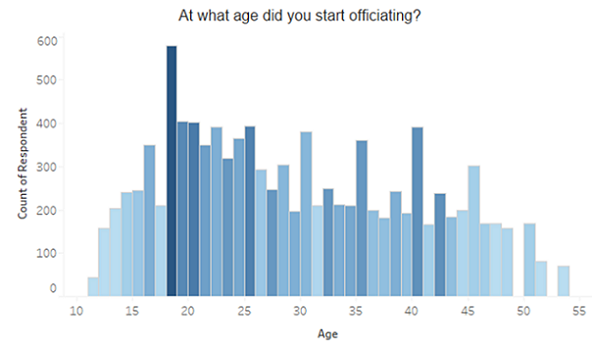
(Most officials start to referee or umpire as teenagers, but don't continue as adults)
If match officials see limited appeal in continuing beyond their mid-20s, a lack of qualified officials becomes a huge disincentive for players to continue playing the game. This is a particular issue where the sport involves physical contact and the role of the official is instrumental to player safety. According to the NASO, the single biggest reason why officials do not re-register as officials is poor sportsmanship, with over 85% of officials reporting verbal abuse in their roles.
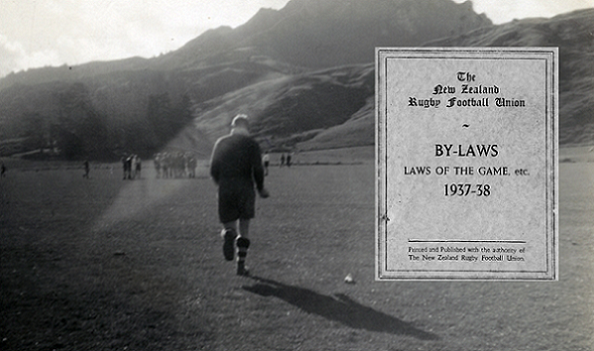
(Many sport officials have an affiliation to and are recruited from an amateur sports club)
Typically, officials have a past club association with the sport they have chosen to officiate. As the ranks of club membership falls, so does the pool of those willing to take on the role of being an official for their chosen code. It’s time for a new national conversation on sports officiating.
Association Congratulates Founding Member, Hamish Bond ...
Association Founding Member and Double Olympic Gold-Medallist Hamish Bond earned a Bronze Medal in the Individual Mens’ Time Trial at Currumbin at the Commonwealth Games last week, by completing the course in 48 minutes and 45.45 seconds.
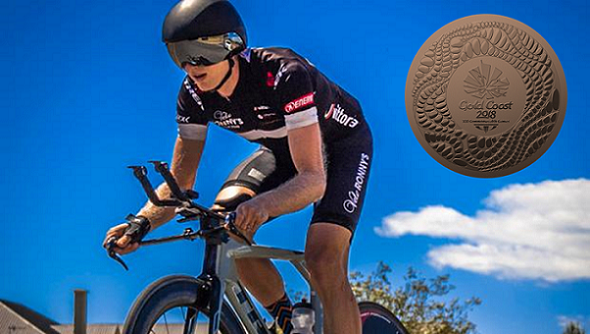
(Commonwealth Games Bronze Medallist, Hamish Bond)
Last week's achievement was another important milestone on his quest to represent New Zealand at the 2020 Summer Olympic Games in Japan. The Association congratulates Hamish on achieving international success in his new sport of cycling, following his earlier rowing successes in the coxless pair, with Eric Murray.
Spacewise Amateur Sports Hour ...
Join Hosts Dave Piper and Adam Julian as they discuss Handball, Kapa Haka, Rugby and other sports in last week’s edition of the show, broadcast on Friday, 13 April.

You can listen to the Amateur Sports Hour by clicking here. The Association would like to thank Spacewise New Zealand for their generous support in making this programme possible.
"Viewpoint" : The Rugby Code ...
Last week, the DominionPost newspaper wrote of the decline of Rugby League in Wellington, where (it was reported), there were no only 42 junior teams in the region, compared to 300 junior Rugby Union sides. The article suggested that Rugby League could disappear from the ranks of the Capital’s amateur sporting clubs within the next five years.
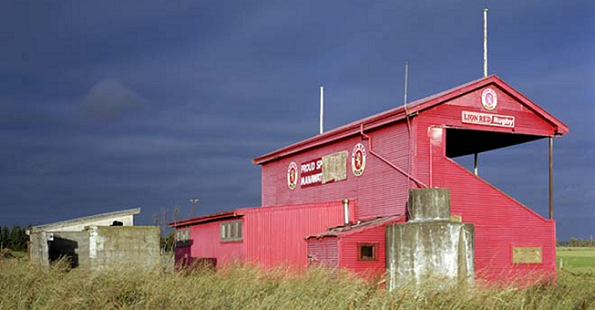
(The future of amateur Rugby League in the Wellington region is reported to be uncertain)
Both League and Union have their origins in the same game, with the “Northern Rugby Union” formed in England in 1895 as a distinct body to the “English Rugby Union”, as a result of working-men receiving payments for playing the game. In short, the antipathy of Rugby Union to Rugby League (as the Northern Union became to be known), arose from one code being strictly amateur and the other professional.
Since the 1990’s, such financial distinctions have become largely meaningless, with both League and Union continuing to play an important role (to a greater or less degree) as part of the sporting social fabric of communities throughout New Zealand. Is there any reason why League’s travails of today, may not become Union’s concerns of tomorrow?
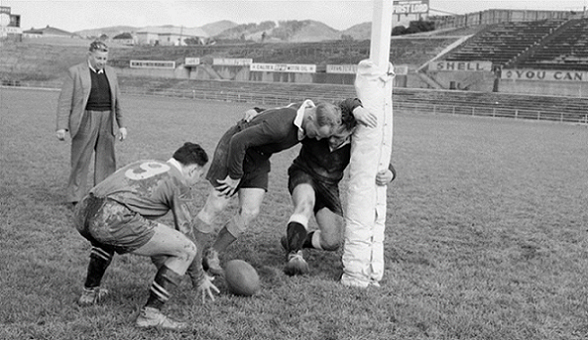
(Are the historic financial differences between League and Union, still relevant today?)
An impartial observer of both games would suggest that they face similar issues: increasing profiling and recruitment of teenage players for professional careers (in New Zealand and Australia); falling player numbers (particularly in the young adult age-group); financially struggling community clubs; and reducing numbers of club volunteers.
Perhaps there is an opportunity for rugby communities across New Zealand (whether League, Union or Touch) to collaborate in creating an environment where the unique identity of each is carefully preserved, but ideas on how to nurture and grow membership are shared.
Strength may come from renewed collaboration, rather than past confrontation.
The 14th Annual Dave Hiddleston Backyard Cricket Ashes ...
In 2004, four of six climbers on Mount Tasman perished in an avalanche, three days into a planned six-day trip. The avalanche swept the entire party 500 metres down the mountainside, over a series of drops to the Grand Plateau. Dave Hiddleston survived the fall but died by the time rescuers flew him by helicopter to Mt Cook village.
For the past 14 years, a group of dedicated cricketers (this year, including Association Board Member John “Mystery” Morrison), have gathered at Hawea Flat to play a commemorative cricket match and celebrate the bonds of friendship, in memory of Dave.
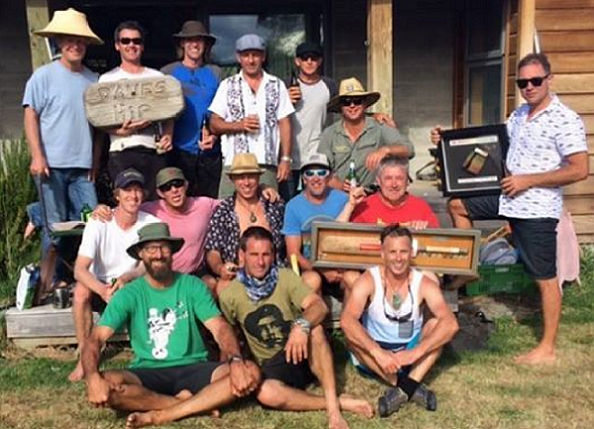
(Cricket is the winner at Hawea Flat in the Dave Hiddleston commemorative match)
As Mark Thomas observed, “there can be no doubt that while the bonds that link us grow stronger each year, the muscles, joints and tendons that dictate our cricketing prowess are doing the exact opposite. The bowling is becoming more haphazard, the batting more random and the fielding, well the fielding was the true barometer of just had far into middle age many of us have descended. Players didn’t so much dive in an attempt to field the ball as collapse, usually several seconds after the ball had already passed.”
Having enjoyed this year’s match at Hawea Flat, John notes it was “a great day, a terrific cause, great company and all ‘For the Love of The Game’”.
House-Hold Income Is A Barrier To Team Sport Participation ...
As amateur sports clubs suffer from increasing financial pressure arising from falling membership, a key factor is that the cost of membership is simply too great for many low-income house-holds to bear. As house-hold incomes struggle to meet the costs of raising and maintaining families in present day New Zealand, their financial priorities, in many cases, struggle to include sporting pursuits.

The US Aspen Institute “State Of Play 2017” survey, highlighted that house-hold income is a major factor for children aged from 6 to 12, who play a team sport at least one day per year (in the US). In 2013, the gap between children in house-holds that earn less than $25,000 and those in $100,000-plus house-holds was 23 percentage points. That gap increased to 32 percentage points in 2016.
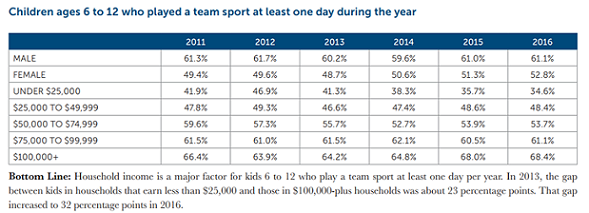
(House-hold income has a direct bearing on child participation in team sports)
Commentators who speak of unavoidable social change as a cause of falling amateur sport club memberships, must also recognise that the trend is associated with growing income inequality. Amateur sports clubs are a social good and should form part of our national social policy in closing the income gap, with the goal of creating a healthy society for all.
From The Archives ...
SPORTS FEDERATION
EVENING POST, VOLUME LXXXIV, ISSUE 148, 19 DECEMBER 1912
“A meeting of amateur sports bodies was held in the Y.M.C.A. Rooms last evening for the purpose of forming an Amateur Sports Federation. Delegates were present representing the New Zealand Rugby and Wellington Rugby Unions, Wellington Referees' Association, Wellington Rowing Association, Wellington Cricket and Junior Cricket Association, Boxing Association, Wellington and New Zealand Lawn Tennis Association, Lacrosse Association, Wellington and New Zealand Amateur Athletic Association, Swimming Association, and the Motor Boat, Yachting, and Motor Cycle Associations. Mr. R. W. McVilly presided.”
The first Chairman of the Amateur Sports Federation was Richard William (“Mac”) McVilly MVO, a long-time supporter of Athletics, Boxing, and Rowing and a long-time, popular member of the Wellesley Club, (and General Manager of the Railways Department).
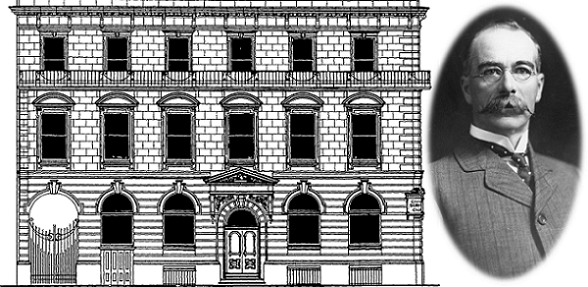
(Richard William McVilly, above, was the first Chairman of the Amateur Sports Federation)
He was popularly known as the “Grand Old Man of Athletics in New Zealand”, with the McVilly Shield (for the Wellington Provincial Club Championship in Amateur Athletics), recognising his contribution to the sport. The fledgling Federation did not survive World War One, with many of New Zealand’s sporting associations being commandeered as patriotic recruiting organisations. The offices of the Association were at the Civil Service Club on the corner of Stout and Ballance Streets in central Wellington, (pictured above).
The Final Word ...
“It's important that kids understand the mentality behind playing team sports, playing for one another and playing with friends.”
(Brian O'Driscoll, Leinster, Ireland and British & Irish Lions Rugby Representative)